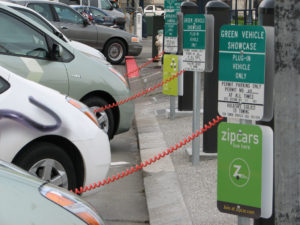Are you thinking of buying an electric car? You’re not alone. Thousands of consumers are motivated to save money on fuel and do their part to stop climate change and clean up the air by burning less gasoline. But what do you need to consider before you actually take the plunge? Here are the pros and cons, courtesy of Citroen Retail Group, our sponsors for this post.
PROS – NO GASOLINE
 In my book, the biggest advantage an electric car offers is about what it doesn’t use – gasoline. Burning gasoline creates carbon dioxide, one of the biggest contributors to climate change. Gas exhaust is also full of the tiny particulates that cause smog and air pollution, which means it’s directly related to asthma and even heart attacks. Drilling for the oil that’s refined into gasoline wreaks havoc on the environment: we all remember the Gulf of Mexico disaster when a BP oil rig exploded, but it turns out there are hundreds of “minor” oil spills every day that foul rivers and streams and endanger people’s health. Even though electric cars are powered by electricity that usually comes from coal-fired power plants, the cars can be charged in off-peak hours essentially using surplus energy, rather than new power produced just for them. And as more and more utilities tap into wind farms, the environmental impact of the electricity used will decrease substantially.
In my book, the biggest advantage an electric car offers is about what it doesn’t use – gasoline. Burning gasoline creates carbon dioxide, one of the biggest contributors to climate change. Gas exhaust is also full of the tiny particulates that cause smog and air pollution, which means it’s directly related to asthma and even heart attacks. Drilling for the oil that’s refined into gasoline wreaks havoc on the environment: we all remember the Gulf of Mexico disaster when a BP oil rig exploded, but it turns out there are hundreds of “minor” oil spills every day that foul rivers and streams and endanger people’s health. Even though electric cars are powered by electricity that usually comes from coal-fired power plants, the cars can be charged in off-peak hours essentially using surplus energy, rather than new power produced just for them. And as more and more utilities tap into wind farms, the environmental impact of the electricity used will decrease substantially.
PROS – NO GAS STATIONS
Electric vehicles (EVs) can be charged in your garage, at home, or at the growing numbers of charging stations that are popping up at shopping malls, grocery stores, apartment buildings, and more. Pull up, plug in, and charge while you have dinner with your family or get your business or shopping done.
PROS – QUIET
One of the lovely benefits of driving an electric car is just how quiet it is. There’s no engine revving or sputtering. Step on the accelerator and off you go.
CONS – BETTER FOR DAILY COMMUTES THAN LONG DISTANCE TRIPS
Most electric vehicles can travel anywhere from 60 to 100 miles or so on a single range. People who commute to work or need to run around shopping or picking up kids from school usually find that even 60 miles in a day is a large enough range. Longer distances require the ability to recharge the battery, and that takes time.
CONS – LONG RECHARGING TIME/RANGE ANXIETY
It can take 8 hours for a battery to fully recharge, so it’s important to remember to plug in the vehicle every day or night. Drivers with access to a “quick charger” may be able to add 50 miles of range in around 20 or 25 minutes, but if a charging station isn’t available, the driver could be stuck waiting for the EV to charge adequately. Meanwhile, drivers who find themselves unexpectedly depleting their car’s battery may feel ‘range anxiety’ about whether or not they can actually arrive at their destination before being able to recharge. Better planning will help make this less of an issue. In addition, drivers can download an app for their mobile device to help them locate the nearest charging station.
CONS – EXPENSE
The sticker price on most electric vehicles is usually higher than a comparably sized gasoline-powered vehicle. However, EVs qualify for various tax breaks that help reduce the price. Plus, the cost of electricity to charge the car will be much less than the price of gasoline. Over time, this will amount to thousands in savings that will help offset the purchase price along with the tax breaks.
My personal opinion is that the “pros” outweigh the “cons,” especially for drivers with a predictable daily commute, access to charging stations as well as one’s home electricity plugs, and the ability to take advantage of government rebates and tax credits to help reduce the purchase price. What do you think?
NOTE: Many thanks to Citroen C Zero Hatchback, our sponsors for this post. Sponsored posts allow us to offer you expert content at no cost to you. Our editorial opinion remains our own. Thanks.


















2 thoughts on “The Pros and Cons of an Electric Car”
Its good to promote electric cars, electric vehicles are environment friendly and fuel efficient as well.
even cars are running by electricity.